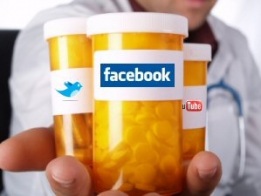- Understanding the essence of digitization in healthcare
- Digital healthcare services are useful.
- Young and old, all use digital services.
- Innovative apps and features are in demand.
- Mobile service is a health catalyst.
- The digital platform creates values.
- 3 steps to work towards digitization for healthcare companies:
Technology has undoubtedly transformed every sphere of life. Ever since the first wave of digitization in the healthcare sector in the 1950s, new technologies continue to transform how healthcare is managed and delivered. Manual tasks get replaced with automated technology; thus, translating the repetitive and elaborate processes into a few minutes? jobs. The second wave of Information Technology in the 1980s brought exemplary changes with integrated processes and B2B procedures. However, the third wave of IT in healthcare brought full digitization of the enterprise; thus, benefiting the business as well as the private lives of patients.
Understanding the essence of digitization in healthcare
Before technology penetrated the core areas of the healthcare domain, several non-healthcare organizations adopted IT to understand their customers better. It helped in building better digital products based on the information for the larger expansion of its own business. It was, therefore, believed that a similar implementation of digital strategies in healthcare would benefit every stratum of the industry. However, digital healthcare strategies are riddled with myths that hold no substantial truth. Extensive research proves actionable and surprising insights about what patients want and how they want to be benefitted.
Digital healthcare services are useful.
Thorough research was carried out to see whether patients wanted to use digital services. There is a misconception that patients often avoid digital services because of the sensitive nature of healthcare which they believe technology may fail to provide. However, the erring belief has been ruled out by the evident reason that the existing services are of poor quality and fail to meet patients’ needs.
Various studies across several countries in the world reveal that people are eager to use digital healthcare services as long as their expectations are met and they receive the best quality of services. It is true that non-digital modes will stay significant and relevant but digital channels should be well-embedded in a visionary way through multichannel procedures. It is expected that a majority of all patients will use digital medical services in the near future.
Young and old, all use digital services.
It’s a common myth that only the younger generation is adept and interested in using medical technology for better accessibility. Therefore, healthcare may not reach out to the system’s ultimate stakeholders. A 2018 article by Digital Commerce 360, however, debunked this myth stating that the older age groups (more than 50 years) are willing to use automated healthcare services. Just like their younger counterparts, the older generation finds automated services easier and quicker. However, they are more interested in traditional digital channels like emails and websites, unlike younger patients who prefer apps, mobile services and social media.
According to another survey conducted back in 2015, more than 70 percent of patients who are older use digital medical care in Germany and the United Kingdom, while the number is desirably higher in Singapore. A report furnished by the European Union suggests that there is more need to diversify the service type according to age, rather than solely focusing on the channels. The older patients are particularly keen on getting information about chronic and acute diseases, while the younger generation is interested in knowing about prevention services and health promotions. Both the generations need information through the digital medium.
Innovative apps and features are in demand.
Health providers and health systems have the common perception that patients want better designing and specifications in digital service offerings. However, patients demand surprisingly more mundane features, such as smooth access to information, improved efficiency, availability of medical attendants, and effective coordination with medical service channels. For a majority of the population comprising of people of the old age bracket are not much keen on better apps and social media services. In nutshell, the dependability is on technology but the demand for modes of services varies as per age.
Mobile service is a health catalyst.
Mobile health plays the catalyst for healthcare evolution. It is hailed as the game changer but its significance is not universal. If you look around you, people are more inclined to using health apps these days, not that the demand is drastically improving. It is, therefore, not the sole critical factor in healthcare improvements.
Mobile devices and other smart devices are the strongest support for the younger generation. Health systems, therefore, can successfully offer solutions to its target group.
For example, lifestyle apps or prenatal health apps are immensely helpful. However, when it comes to complicated medical circumstances or managing chronic conditions, it pays off better to visit a doctor.
The digital platform creates values.
When starting out on a bigger platform with digitized integration, many think that going “big” is the right way to capture a large audience target. Building a more integrated and comprehensive platform may not always serve it rightfully in meeting the needs of the target audience. Besides, you may find it difficult to keep up with the ongoing complications that a process goes through initially. Therefore, the advice is to start small but act fast. The focus is to keep it simple and informative understanding what matters to patients.
A majority of patients often look out for easy navigation and assistance for routine tasks in medical technology. In a survey conducted across countries like the United Kingdom, Germany and Singapore, it has been found that the most common services demanded by patients are related to finding assistance with scheduling a physician’s appointment. The other demands cited by patients include supportive help for administrative tasks like prescription refills and support of specialists. The best part of these services is they can be carried out without large investments in IT.
3 steps to work towards digitization for healthcare companies:
1. Giving patients what they want.
The first step is about understanding the accurate needs of patients. It is best practiced by assessing the performance of competitors, what they are offering to their patients, etc. Comparing the services of competitors with your own performances and understanding what is already there in place and what more could be offered proves helpful.
2. Segmenting investments in services based on certain criteria.
Every healthcare organization contemplating to digitize its services should consider dividing them based on the categories. This includes considering the amount of investment required, creating values through services and estimating demands of patients. There should be proper research about the unmet demands, the profound needs that have not been fulfilled etc.
3. New services to keep the system updated.
The healthcare system needs timely upgrading. The first move should be towards allowing patients to get acquainted with the basic idea of digitization. Then begins the offerings of high value, complex services. For example, mobile health records and integrated-care apps. A significant user-base can be successfully created by using social media like Facebook and Google.
Digitization is a revolutionizing idea to create a massive wave of improvements in the healthcare sector. Using the right digital strategies work effectively in understanding the real demands of patients and working out a way to transform their medical journey into an easy and mutually beneficial experience.









